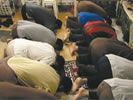Eye For Film >> Movies >> Hot House (2006) Film Review
Sometimes it seems as though all the world’s documentary makers are walking the streets of Palestine and Israel, waiting to jump on unsuspecting passers-by and quiz them on the conflict. Given the glut of films about the area, then, it is all the more commendable that director Shimon Dotan has found a fresh angle – and one that offers a unique insight.
Taking his camera behind the bars of the Be’er Sheba, Ashkelon, Hadarim and Megiddo prisons, he interviews both men and women, viewed as terrorists by Israel and as national freedom fighting heroes by the Palestinians.

What emerges is surprising. Alongside tales of suicide bombing and the fight for freedom is a maturity. Many of the men, in particular, have been inside for years and have spent their time wisely, genning up on world politics and considering their country’s plight. As one of the perceptively suggests, there has to be an alternative to “mutual destruction”.
It is the prisoners’ thoughtfulness which comes as the biggest surprise. It would be easy to suspect jails would merely become a breeding ground for terrorists – as has often been the case elsewhere. What emerges, however, is a much more complex picture, with prisoners ‘growing up’ on the inside to become leaders of men, organising committees split down party lines and – later, on release – going on to form part of the Palestinian government.
In order to communicate with the guards and benefit from studying, the inmates learn Hebrew. This seems to have given them a greater understanding of ‘their enemy’ and, in turn garners them a level of respect with their Israeli captors.
In addition to giving us a feel for the sentiment within the jail walls, Dotan also shows the ludicrousness of some of the imprisonments. Several Hamas members, it seems, have been locked up merely for voicing their views with the implication being that this heavy-handedness on the part of Israel may have boosted their party's path to power.
His style is sharp and swift, intercutting multiple testimonies to build, what feels like a comprehensive picture. Ron Klein’s scoring is perhaps a little intrusive at times, but on the whole it helps keep up the pace. There is little evidence of polemic here and clear attempts are made to ‘round out’ the documentary with comments from the prison guards.
Dotan also doesn’t shy away from the tough issue of those who are filled with hatred for Israel to the extent of wanting to “strap bombs to my children” to cause death. This includes a particularly chilling piece of testimony from one female prisoner, who happily chats about organising the suicide bombing of a restaurant without a shred of remorse for the children killed there. In fact, it is the women who seem most incensed in general, as one visitor to the prison puts it: “The world is slaughtering us… and then wants to give us sympathy.”
Despite these calls to arms, however, there is a sense that killing is a bi-product of a struggle that many would like to leave behind.
Agonisingly, you sense that if only those outside the prisons could engage in the sort of healthy dialogue found within, the region would be all the better for it.
Reviewed on: 02 Mar 2007

















